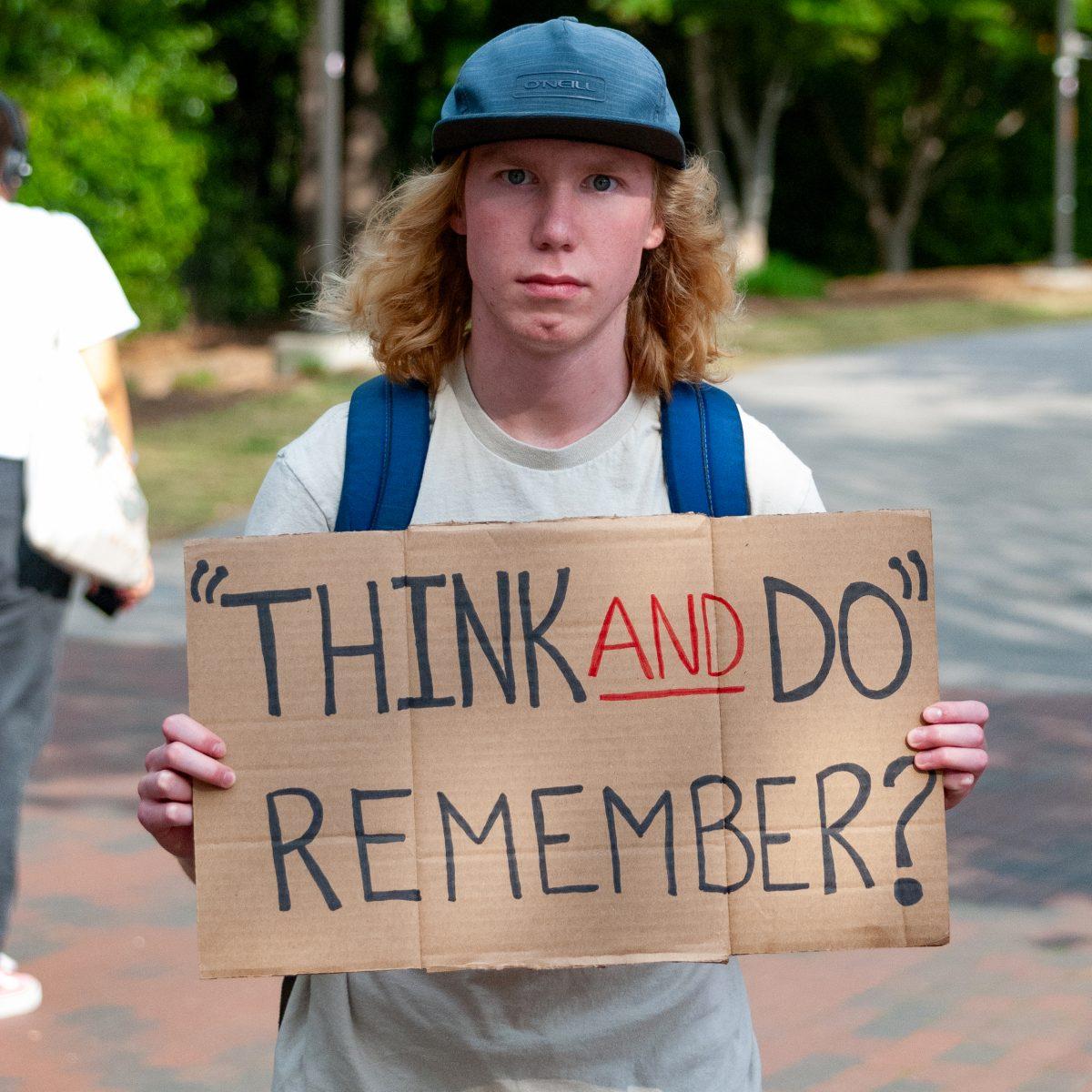
Caz Doyle
Oscar Cleaveland, a first-year in sustainable materials and technology, holds a sign during Earth Fair at Stafford Commons on Wednesday, April 14, 2023. The event sponsored by NC State’s University Sustainability Office offered education on sustainable practices.
Students gathered in Wolf Plaza on Wednesday to protest the ongoing investments NC State has in fossil fuel and military industries. The event was planned by Dissenters NCSU and NC State Students for Decarbonization in order to encourage students to take more action against climate change.
Noah Liguori-Bills, a graduate student studying atmospheric science and president of Students for Decarbonization, said the University must pivot towards investing in renewable energy and away from investing in industries contributing to carbon emissions for the sake of the planet.
In 2019, Technician reported that NC State held over $43 million in fossil fuel industry investments. Current data could not be found, but in 2023 NC State invested 3.6% of its investment into the energy market.
Liguori-Bills said the push for the divestment from fossil fuels is a movement that has been gaining momentum over time. He said he hopes for NC State to become a leader in the movement already supported by over 100 institutions, including the California State University system and New York University.
The rally was not just about fossil fuels, but also about the role of US military operations in carbon emissions. John Hanlon, a first-year studying engineering, said he thinks it is unfortunate that so many engineers go into military industries.
“I suppose to some extent, for some majors and programs, it is sort of expected that those students would go into those companies to work for the military-industrial complex,” Hanlon said. “You could definitely see that with how many of those companies were at the engineering career fair this February.”
Sam Perkins, a fourth-year studying anthropology and president of Dissenters NCSU, said the group’s overall intention is to demote militarism as a part of foreign policy and there has been progress in raising awareness of the interaction of politics, climate change and one’s chosen field of study.
“We’ve got more people joining our newsletter and showing interest in raising their political consciousness,” Perkins said. “We’re a mostly engineering campus and obviously engineering and the military go hand-in-hand, so bringing more folks into awareness of where their skills, their money and their jobs might be going, I think, is really important.”
Liguori-Bills said while campus culture has been overall receptive to Students for Decarbonization’s mission to divest, it has been less open to changing its attitude towards employers.
“Especially in the School of Engineering, the military-industrial complex is a very big employer of engineering students,” Liguori-Bills said. “Sometimes students take jobs for companies that they don’t even know are actually manufacturing weapons, like Boeing.”
Hwa Huang, a doctoral student studying marine and atmospheric science and a member of the Graduate Workers Union, criticized the University for not spending enough on its students.
“Why can’t we see about redirecting some of the funds for the grant workers, because my stipend right now is $20k,” Huang said. “If it weren’t for the fact that I’m splitting my rent with three other people, I don’t think I could live in Raleigh.”
In his speech, Huang also turned the attention towards the University administration and its handling of the PCBs in Poe Hall.
“The University admin and particularly the Board of Trustees has shown a commitment to maintaining the institution’s prestigious image and profit as opposed to protecting the people who learn and work at NC State,” Huang said. “So why is the University putting money into private industry like the military-industrial complex and fossil fuels instead of our well-being?”
However, Liguori-Bills said students should not be pessimistic about their impact on their institutions and communities, as there are now more ways to raise awareness and change systems than in the past.
“Right now, we are living in the moment where we can have the most capacity to change future climate outcomes, and so ‘climate doomism’ is less justified now than any other time in human history,” Liguori-Bills said. “The first step is to recognize that hopelessness is unfounded in truth, and we should all be hopeful around change and do something about it.”